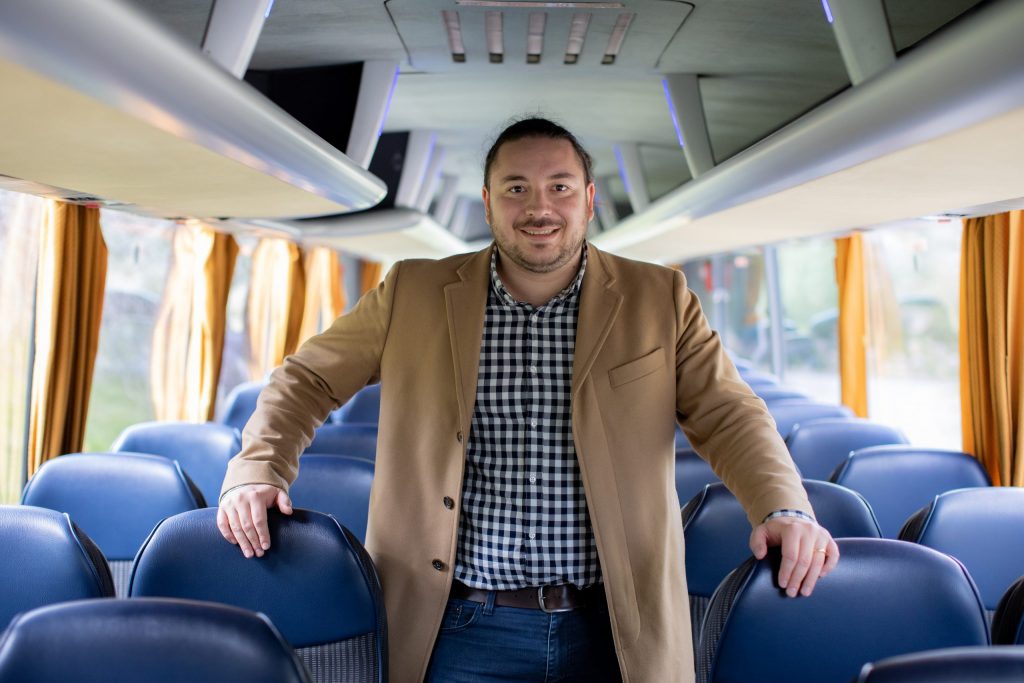Oct 21, 2020. Interview with Thibaud Kistler, Vice President Of Global Operations at BusUp U.S.A. by Esther Sardans.
What is the story behind your joining BusUp?
BusUp reached out to me due my past experience at RidePal. This is how I meet Rui Stoffel (BusUp’s CEO and co-founder). We discussed my previous experiences in the mobility sector and the opportunities for a shared mobility company such as BusUp in United States market. We realized we shared the same views of the sector and connected regularly to discuss BusUp and the opportunity for almost a year. After that I decided that I really wanted to join BusUp and develop the business in the United States.
BusUp’s unique sharing abilities and full management service are an awesome combination for corporations, universities and business parks of every major city in the United States.
Why did you choose BusUp?
I am very passionate about the transportation industry and always felt like there was a need for a company like BusUp in this space. When I met Rui, I was very excited to see that someone else shared my vision and belief. I think BusUp solves a very real need in the transportation industry and am very happy to fill that need. Most importantly, I am a firm believer in trying to do something good for the planet and BusUp’s mission to reduce traffic, CO2 emissions and car usage strongly appeals to me.
The most important problem BusUp can solve in this market is the inability for smaller corporations to offer commuting programs to their employees.
Why is BusUp the right fit for the United States? Which problems can BusUp solve?
Even though the United States market is probably a little more mature in terms of transportation (major commute programs like Google, Facebook, Apple, etc.), BusUp’s unique sharing abilities and full management service are an awesome combination for corporations, universities and business parks of every major city in the United States.
According to the US Census Bureau, there are roughly 5.6 million companies in the United States with 99.7% of these having less than 500 employees. These are the companies that can not necessarily afford to run their own transportation program and that would greatly benefit from shared commuting options.
The most important problem BusUp can solve in this market is the inability for smaller corporations to offer commuting programs to their employees. This is mostly due to the cost of running such an operation. By enabling the sharing of this cost we can touch a much larger audience that had no access to these programs before.
Seeing this issue from the cities perspective, most major cities in the United States have traffic issues due to people living in the Suburban areas and working in the city. Promoting the use of shared mobility options will enable traffic reduction and make the cities more livable.
Finally, looking at the commute problem from a more global perspective, collectively cars and trucks account for nearly one-fifth of all US CO2 emissions. A passenger car carrying one person emits 89 pounds of CO2 per 100 passenger miles, while a full bus emits only 14 pounds. By adopting BusUp, people can have a real impact on the environment.
Easy ways to get to and from the workplace are one of the most important factors when choosing a new job in the U.S.
How can American companies benefit from BusUp’s services?
Easy ways to get to and from the workplace are one of the most important factors when choosing a new job. A lot of smaller companies can not afford offering commuter transportation as a perk to their employees and therefore are not as attractive as the big companies that already have this service in place.
BusUp’s offering for shared commuter transportation is key here in the United States. By enabling multiple smaller companies to share and running the program for them BusUp enables them to offer transportation to their employees. In terms, offering transportation options to their employees, smaller companies will then be able to compete in hiring in areas where they would never have been able to source talent.
For example, around the San Francisco Bay area there are multiple large businesses parks which have difficult access to public transportation, whether it is to come from the San Francisco downtown area, East Bay, South Bay or from a public transportation hub to the business park (last mile). These business parks are usually filled with smaller businesses which can not afford to put in place or run a transportation program. By offering the ability to share and run the program for them, BusUp can allow them to offer this perk to their employees.
How do you think Covid-19 will affect mobility in general and BusUp in particular?
I think COVID-19 will affect BusUp and the transportation in two separate waves. The first one is simply that due to the confinement and the extremely limited mobility the transportation industry has almost stopped and is now waiting for activity to slowly start back again.
Contact tracing will be key to ensure a safe commute to work. In order to prevent new outbreaks, it will be essential, for both corporations and commuters, to know if a passenger has shared a ride with a positive contact.
Once this wave has passed, I believe there will be a greater need for companies like BusUp that enable more control on the service in terms of bus sanitation and contact tracing. If nothing is done and things are simply left to what they were before, the individual car usage will rise drastically as this would be the only option people feel comfortable with. A recent study in the San Francisco Bay Area showed that there may be an increase of up to 42% in individual car use. This is not the solution as traffic and pollution is already a big issue around the Bay.
Contact tracing will be key to ensure a safe commute to work. In order to prevent new outbreaks, it will be essential, for both corporations and commuters, to know if a passenger has shared a ride with a positive contact.
For this purpose, BusUp’s technology is great. If a BusUp’s passenger tests positive to the virus, our technology can identify all the passengers that have been in contact with that passenger, within the past 2 weeks and alert them, thus preventing a new focus of contagion inside the working environment and the community
Where do you see the future of mobility?
I feel like people will be less and less interested in owning cars or any other mobility equipment. Mobility will move more and more toward something that can be consumed easily. We already see this trend happening with scooters apps, Lyft, Uber, carpooling, vanpooling, and car rentals like Zipcar etc… Moving in that direction will force governments and companies to offer more options to people and hopefully work together to make the transition to a more sustainable world.
Changing the way people commute, from driving a car to riding a bus, means that they will get back one hour of their life per day…This is a major life changer and I’m glad to be able to participate in it!
How do you think transportation can change people’s lives?
The average commute time in the United States is about 1 hour per day. This represents 10 full 24 hours days a year. Changing the way people commute, from driving a car to riding a bus, means that they will get back one hour of their life per day. This will not only remove the time spent driving but also the associated stress that comes from commuting behind the steering wheel on a daily basis. This is a major life changer and I’m glad to be able to participate in it!

Esther Sardans is a renowned journalist, communication expert and coach. @EstherSardans
